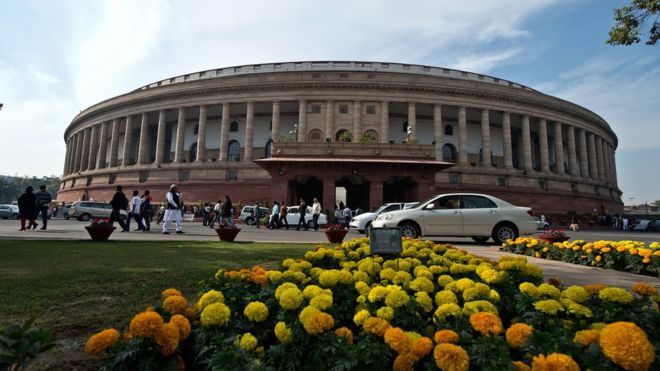Election 2019: fractured mandate?
January 26, 2019 | Expert Insights

Prime Minister Narendra Modi’s ruling coalition National Democratic Alliance (NDA) will emerge as the largest group in a parliamentary election expected in the next few months but will fall short of a majority required to rule, suggests a new nationwide survey.
Background
According to the Constitution of India, elections for the Parliament and the State Legislative Assemblies should take place every five years, unless a state of emergency has been declared. Any vacancy caused by death or resignation must be filled through an election within six months of any such occurrence. The elections for the lower houses (in Parliament and in the states) use the first-past-the-post electoral system (i.e. the candidate with the majority of the votes wins the election).
The Indian general election, 2014 was held to constitute the 16th Lok Sabha, electing members of parliament for all 543 parliamentary constituencies. Running in nine phases from 7 April to 12 May 2014, it was the longest election in the country's history. According to the Election Commission of India, 814.5 million people were eligible to vote, with an increase of 100 million voters since the last general election in 2009, making it the largest ever election in the world.
General elections are due to be held in India between April and May 2019 to constitute the 17th Lok Sabha. The elections can be held at an earlier date if the Council of Ministers recommends dissolution of the 16th Lok Sabha to the President of India. However, the government has publicly announced that the elections will be held according to schedule.
Legislative Assembly elections in the states of Andhra Pradesh, Arunachal Pradesh, Haryana, Odisha, Sikkim and Jammu and Kashmir are expected to be held simultaneously with the general elections. On 12 January 2019, Prime Minister Narendra Modi launched the Bharatiya Janata Party's election campaign; which sought a second term in government.
Analysis
The ruling Bharatiya Janata Party-led alliance is forecast to win 233 of the 543 seats in parliament at stake, the poll by ABP News-CVoter said, short of the half-way mark of 272. A survey by India Today-Karvy Insights put the BJP and its allies on 237 seats.
Modi, who swept to power in 2014 with the biggest majority seen in India in decades, is facing public discontent over a lack of jobs and a weak farm economy. No date has yet been announced for the election, which must be held by May.
The organisers of the poll said 22,309 voters were surveyed across all 543 seats of the Lok Sabha over Dec-Jan. Opinion polls have a mixed record in India where millions of people vote. Another survey showed the BJP facing a rout in the most populous state, Uttar Pradesh, which sends the largest number of representatives to parliament and holds the key to which party forms a government. The poll also showed the BJP doing badly in Uttar Pradesh, slumping to just 25 of the 80 seats at stake. In 2014, this state propelled Modi to victory handing his group 73 seats.
Two powerful parties representing India’s lower castes in the rigid Hindu hierarchy as well as minority Muslims have come together in Uttar Pradesh and that is hurting the BJP, the surveys showed. “In a nutshell a popular prime minister (Modi) is facing stiff challenge from a united opposition,” ABP said summing up the results of its survey. “Also, his popularity is facing headwinds due to depressed economic sentiment. A combination of the two may lead to domino effects of driving away the fence sitters and rallying the faithful of opposition,” it said.
The ruling BJP will make up some of its losses with victories in the eastern states where its influence has been limited in the past, the poll said. However, it will still be 39 seats short of the simple majority required to rule and will have to try to stitch together alliances with regional parties.
The ABP poll showed the main opposition Congress taking 167 seats and the regional parties together 143. The Congress has appointed Priyanka Gandhi, sister of its president Rahul Gandhi, to a party post in a move aimed at further energising the party ranks who see the Nehru-Gandhi family as vote-getters. India Today said it conducted face-to-face interviews with 13,179 voters across 97 parliamentary constituencies for its survey.
Assessment
Our assessment is that a fractured mandate is likely at this stage with the resurgence of a promising mega-coalition of regional parties and the Congress to challenge the BJP. We believe that the BJP will not experience the same amount of public support it received in the run-up to the 2014 General Elections.








Comments